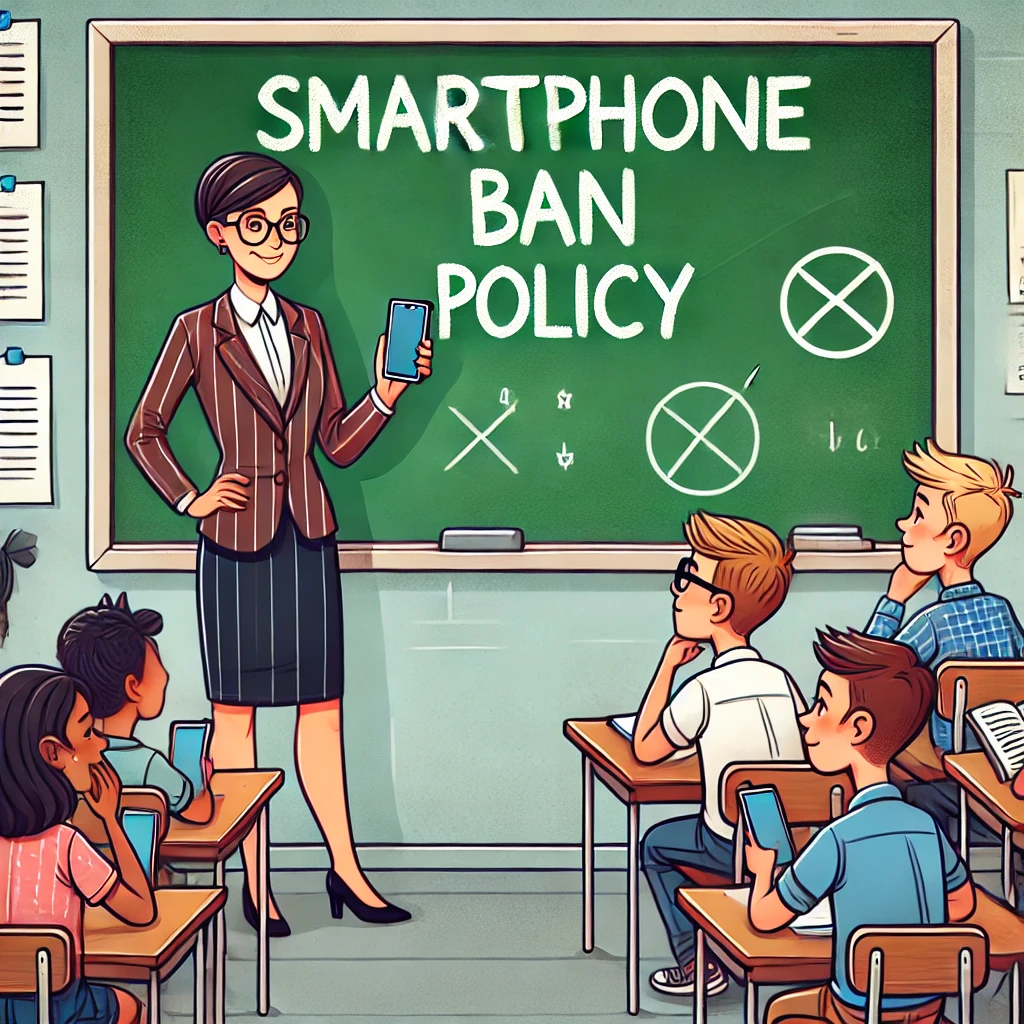Some US states are thinking about stopping kids from using smartphones in school because they’re worried that kids are getting too dependent on them. California and New York, which are two big states, are talking about making rules for the whole state. This isn’t a new worry – schools have been talking about whether or not to let kids use phones for a long time. But now, they want to make the rules even stricter. Right now, about 76% of schools already have rules that say kids can’t use their phones for non-school stuff during the school year.
People have been arguing about whether or not phones should be allowed in schools for a long time. At first, people were worried that phones would be distracting and that they were connected to drugs. But after a shooting happened at Columbine High School in 1999, people started to see phones as an important way for kids to get help in an emergency. Some states changed their rules and let kids use their phones, like California did in 2002. But then the debate started again because schools realized that phones were causing problems – they were distracting kids, being used for bullying, and even for cheating. In New York City, they had a strict rule against phones at first, but then they let each school make their own rules.
The reason why people want to ban phones in schools now is because they’re worried about kids’ mental health and how much time they spend on social media. The Surgeon General, who is a really important doctor, wants social media sites to have warning labels, like cigarettes do. That’s because research has shown that using social media too much can make kids have more mental health problems. Experts say that having phones in schools makes it hard for kids to focus, make friends, and learn well.
It’s not easy to make these rules and make sure everyone follows them. Schools need to have a lot of people agree with the rules and make sure they’re always being followed. The president of the National School Safety and Security Services, Ken Trump, says that it’s a really complicated problem. In Los Angeles, the school board voted to ban phones, but they’re still not sure how they’re going to make it happen. Some kids say that it’s impossible to watch thousands of students on big school campuses.
In the end, US states are thinking about banning smartphones in schools because they’re worried that kids are getting too dependent on them. People have been arguing about this for a long time, but now they’re worried about kids’ mental health and social media use. It’s not easy to make these rules and make sure everyone follows them, but schools are trying to find a balance between keeping kids safe and stopping them from getting distracted.
Original news source: US states want to ban phones in schools. It might be a challenge (BBC)
🎧 Listen:
Slow
Normal
Fast
📖 Vocabulary:
| 1 | dependent | Relying on something or someone else |
| 2 | stricter | More severe or tough |
| 3 | distracting | Taking attention away from something |
| 4 | emergency | A sudden and dangerous situation that requires immediate action |
| 5 | debate | A discussion where people have different opinions |
| 6 | bullying | Intentionally hurting or frightening someone weaker |
| 7 | cheating | Acting dishonestly to gain an advantage |
| 8 | mental health | The state of someone’s emotional and psychological well-being |
| 9 | Surgeon General | The top medical officer in the country |
| 10 | research | Careful study to find out new information |
| 11 | focus | To concentrate on something |
| 12 | complicated | Hard to understand or deal with |
| 13 | campuses | The grounds and buildings of a school or university |
| 14 | dependent | Relying on something or someone else |
| 15 | balance | A state where different things occur in equal or proper amounts |
Group or Classroom Activities
Warm-up Activities:
– News Summary
Instructions: Have students read the article and then summarize the main points in their own words. They can do this individually or in pairs. Afterward, have a class discussion to compare and discuss the different summaries.
– Opinion Poll
Instructions: Divide the class into groups and have each group discuss whether or not they think smartphones should be banned in schools. Then, have each group create a poll with questions related to the topic. Afterward, have groups share their polls with the class and conduct a class-wide opinion poll by having students vote on the different questions.
– Pros and Cons
Instructions: Divide the class into pairs and have each pair discuss the pros and cons of allowing smartphones in schools. They should write down their ideas and then share them with the class. Afterward, have a class discussion to compare and contrast the different perspectives.
– Think-Pair-Share
Instructions: Have students individually read the article and think about their own opinions on the topic. Then, pair them up and have them discuss their thoughts with their partner. Finally, have pairs share their opinions with the whole class and facilitate a class discussion on the topic.
– Future Predictions
Instructions: Have students work individually or in pairs to make predictions about the future of smartphones in schools. They should consider the arguments presented in the article and any additional thoughts they have. Afterward, have students present their predictions to the class and discuss the likelihood and potential impact of each prediction.
🤔 Comprehension Questions:
1. Why are some US states considering banning smartphones in schools?
2. What are some concerns people have about kids using smartphones in school?
3. How have schools’ rules about smartphones changed over time?
4. Why did some schools change their rules to allow kids to use phones after the shooting at Columbine High School?
5. Why did the debate about phones in schools start again after California allowed kids to use them?
6. What are some reasons why people want to ban phones in schools now?
7. Why is it difficult to make and enforce rules about smartphones in schools?
8. What is the goal of schools when it comes to smartphones – keeping kids safe or preventing distractions?
Go to answers ⇩
🎧✍️ Listen and Fill in the Gaps:
Some US states are (1)______ about stopping kids from using smartphones in school because they’re (2)______ that kids are (3)______ too dependent on them. California and New York, which are two big states, are (4)______ about making rules for the whole state. This isn’t a new worry – schools have been talking about whether or not to let kids use phones for a long time. But now, they want to make the rules even stricter. Right now, about 76% of schools already have rules that say kids can’t use their phones for non-school stuff during the school year.
People have been arguing about whether or not phones should be allowed in schools for a long time. At first, people were worried that phones would be distracting and that they were connected to drugs. But after a shooting happened at Columbine High School in 1999, people (5)______ to see phones as an (6)______ way for kids to get help in an emergency. Some states changed their rules and let kids use their phones, like (7)______ did in 2002. But then the debate started again because schools realized that phones were causing problems – they were distracting kids, being used for (8)______, and even for cheating. In New York City, they had a strict rule against phones at first, but then they let each school make their own rules.
The reason why people want to ban phones in schools now is because they’re worried about kids’ (9)______ health and how much time they spend on social media. The Surgeon General, who is a really important (10)______, (11)______ social media sites to have warning labels, like cigarettes do. That’s because research has shown that using social media too much can make kids have more mental health problems. Experts say that having phones in schools makes it hard for kids to focus, make friends, and learn well.
It’s not easy to make these rules and make sure everyone follows them. Schools need to have a lot of people (12)______ with the rules and make sure they’re always being followed. The president of the National School Safety and Security Services, Ken Trump, says that it’s a really complicated problem. In Los Angeles, the school board (13)______ to ban phones, but they’re still not sure how they’re going to make it happen. Some kids say that it’s impossible to watch thousands of students on big school campuses.
In the end, US states are thinking about banning smartphones in (14)______ because they’re worried that kids are getting too dependent on them. (15)______ have been arguing about this for a long time, but now they’re worried about kids’ mental health and social media use. It’s not easy to make these rules and make sure everyone follows them, but schools are (16)______ to find a balance between keeping kids safe and stopping them from getting distracted.
Go to answers ⇩
💬 Discussion Questions:
Students can ask a partner these questions, or discuss them as a group.
1. What do you think about the idea of banning smartphones in schools?
2. How would you feel if you were not allowed to use your phone at school?
3. Do you think smartphones are distracting for students? Why or why not?
4. What is your opinion on using phones for non-school stuff during the school year?
5. How do you think banning smartphones in schools would affect students’ mental health?
6. Do you think social media has a negative impact on students’ mental health? Why or why not?
7. What are some benefits of having smartphones in schools?
8. How do you think banning smartphones in schools would affect students’ ability to make friends?
9. Do you think it’s possible for schools to effectively enforce a ban on smartphones? Why or why not?
10. How do you think banning smartphones in schools would affect students’ learning?
11. What are some alternatives to using smartphones in schools for educational purposes?
12. How do you think banning smartphones in schools would affect students’ overall safety?
13. Do you think it’s fair for schools to make rules about students’ phone use? Why or why not?
14. How do you think banning smartphones in schools would affect students’ ability to stay connected with their families?
15. What are some potential challenges schools might face if they ban smartphones?
Individual Activities
📖💭 Vocabulary Meanings:
Match each word to its meaning.
Words:
1. dependent
2. stricter
3. distracting
4. emergency
5. debate
6. bullying
7. cheating
8. mental health
9. Surgeon General
10. research
11. focus
12. complicated
13. campuses
14. dependent
15. balance
Meanings:
(A) Relying on something or someone else
(B) The grounds and buildings of a school or university
(C) Careful study to find out new information
(D) Taking attention away from something
(E) A sudden and dangerous situation that requires immediate action
(F) Acting dishonestly to gain an advantage
(G) More severe or tough
(H) Relying on something or someone else
(I) To concentrate on something
(J) Hard to understand or deal with
(K) A discussion where people have different opinions
(L) The state of someone’s emotional and psychological well-being
(M) A state where different things occur in equal or proper amounts
(N) The top medical officer in the country
(O) Intentionally hurting or frightening someone weaker
Go to answers ⇩
🔡 Multiple Choice Questions:
1. Why are some US states considering banning smartphones in schools?
(a) They are concerned that kids are becoming too dependent on them.
(b) They want to encourage kids to use other forms of technology.
(c) They believe smartphones are causing health problems.
(d) They want to prevent kids from accessing social media.
2. What percentage of schools currently have rules against using phones for non-school activities?
(a) 76%
(b) 50%
(c) 25%
(d) 100%
3. Why did some states initially allow kids to use phones in schools?
(a) They believed phones would improve academic performance.
(b) They saw them as a way for kids to get help in emergencies.
(c) They thought phones would reduce bullying.
(d) They wanted to keep up with technological advancements.
4. Why did the debate about phones in schools start again?
(a) Parents demanded stricter rules regarding phone use.
(b) The Surgeon General issued a warning about the dangers of smartphones.
(c) Schools realized that phones were causing problems such as distractions and bullying.
(d) Students began using phones for cheating on exams.
5. Why are some experts concerned about kids’ mental health and social media use?
(a) Social media sites do not have warning labels like cigarettes.
(b) Kids are spending too much time on their phones instead of interacting with others.
(c) Schools have seen a decline in academic performance due to social media use.
(d) Research has shown that excessive social media use can lead to mental health problems.
6. What is the main challenge in implementing rules against smartphone use in schools?
(a) Convincing parents to support the ban.
(b) Finding alternative devices for students to use.
(c) Ensuring that everyone follows the rules.
(d) Training teachers on how to enforce the rules.
7. What did the Los Angeles school board vote on regarding smartphones?
(a) To allow each school to make their own rules.
(b) To ban their use in schools.
(c) To provide warning labels on social media sites.
(d) To conduct further research on the effects of smartphones on students.
8. What is the main goal of banning smartphones in schools?
(a) To encourage students to use other forms of technology.
(b) To prevent students from accessing social media.
(c) To reduce the dependence of kids on smartphones.
(d) To find a balance between student safety and minimizing distractions.
Go to answers ⇩
🕵️ True or False Questions:
1. After the Columbine High School shooting in 1999, phones were seen as an important tool for students to seek help during emergencies, leading some states to change their rules and allow phone use.
2. The goal is to prioritize distractions over safety to hinder focus, social interaction, and effective learning.
3. Currently, about 76% of schools already have rules in place that prohibit students from using their phones for non-school activities during the school year.
4. The debate about whether or not phones should be allowed in schools has been ongoing for a long time, with concerns initially focused on distractions and connections to drugs.
5. The current push to ban phones in schools is driven by concerns about kids’ mental health and excessive social media use, with research showing a link between social media use and mental health problems.
6. However, schools later realized that phones were not causing problems such as distractions, bullying, and cheating, prompting a renewed debate on the issue.
7. Some US states, including Florida and Texas, are not considering implementing rules to prevent kids from using smartphones in school.
8. Implementing and enforcing these guidelines is easy, as schools only need limited agreement and monitoring to ensure compliance.
Go to answers ⇩
📝 Write a Summary:
Write a summary of this news article in two sentences.
Check your writing now with the best free AI for English writing!
Writing Questions:
Answer the following questions. Write as much as you can for each answer.
Check your answers with our free English writing assistant!
1. Why are some US states considering banning smartphones in schools?
2. What were some of the initial concerns about allowing phones in schools?
3. Why did the debate about phones in schools start again after they were initially allowed?
4. What are the current concerns about kids using smartphones in schools?
5. Why is it difficult to enforce rules about smartphone use in schools?
✅ Answers
🤔✅ Comprehension Question Answers:
1. Why are some US states considering banning smartphones in schools?
Some US states are considering banning smartphones in schools because they are worried that kids are becoming too dependent on them.
2. What are some concerns people have about kids using smartphones in school?
Some concerns people have about kids using smartphones in school are that they can be distracting, used for bullying, and even for cheating.
3. How have schools’ rules about smartphones changed over time?
Schools’ rules about smartphones have changed over time. Some states initially allowed kids to use their phones after the shooting at Columbine High School in 1999, but then realized that phones were causing problems and became stricter with their rules.
4. Why did some schools change their rules to allow kids to use phones after the shooting at Columbine High School?
Some schools changed their rules to allow kids to use phones after the shooting at Columbine High School because they saw phones as an important way for kids to get help in an emergency.
5. Why did the debate about phones in schools start again after California allowed kids to use them?
The debate about phones in schools started again after California allowed kids to use them because schools realized that phones were causing problems such as distractions, bullying, and cheating.
6. What are some reasons why people want to ban phones in schools now?
Some reasons why people want to ban phones in schools now are concerns about kids’ mental health and how much time they spend on social media. Research has shown that using social media too much can lead to more mental health problems.
7. Why is it difficult to make and enforce rules about smartphones in schools?
It is difficult to make and enforce rules about smartphones in schools because it requires a lot of people to agree with the rules and ensure that they are always being followed. Additionally, it can be challenging to monitor thousands of students on large school campuses.
8. What is the goal of schools when it comes to smartphones – keeping kids safe or preventing distractions?
The goal of schools when it comes to smartphones is to find a balance between keeping kids safe and preventing distractions. They want to ensure that students can focus, make friends, and learn well while also addressing concerns about mental health and social media use.
Go back to questions ⇧
🎧✍️✅ Listen and Fill in the Gaps Answers:
(1) thinking
(2) worried
(3) getting
(4) talking
(5) started
(6) important
(7) California
(8) bullying
(9) mental
(10) doctor
(11) wants
(12) agree
(13) voted
(14) schools
(15) People
(16) trying
Go back to questions ⇧
📖💭✅ Vocabulary Meanings Answers:
1. dependent
Answer: (A) Relying on something or someone else
2. stricter
Answer: (G) More severe or tough
3. distracting
Answer: (D) Taking attention away from something
4. emergency
Answer: (E) A sudden and dangerous situation that requires immediate action
5. debate
Answer: (K) A discussion where people have different opinions
6. bullying
Answer: (O) Intentionally hurting or frightening someone weaker
7. cheating
Answer: (F) Acting dishonestly to gain an advantage
8. mental health
Answer: (L) The state of someone’s emotional and psychological well-being
9. Surgeon General
Answer: (N) The top medical officer in the country
10. research
Answer: (C) Careful study to find out new information
11. focus
Answer: (I) To concentrate on something
12. complicated
Answer: (J) Hard to understand or deal with
13. campuses
Answer: (B) The grounds and buildings of a school or university
14. dependent
Answer: (A) Relying on something or someone else
15. balance
Answer: (M) A state where different things occur in equal or proper amounts
Go back to questions ⇧
🔡✅ Multiple Choice Answers:
1. Why are some US states considering banning smartphones in schools?
Answer: (a) They are concerned that kids are becoming too dependent on them.
2. What percentage of schools currently have rules against using phones for non-school activities?
Answer: (a) 76%
3. Why did some states initially allow kids to use phones in schools?
Answer: (b) They saw them as a way for kids to get help in emergencies.
4. Why did the debate about phones in schools start again?
Answer: (c) Schools realized that phones were causing problems such as distractions and bullying.
5. Why are some experts concerned about kids’ mental health and social media use?
Answer: (d) Research has shown that excessive social media use can lead to mental health problems.
6. What is the main challenge in implementing rules against smartphone use in schools?
Answer: (c) Ensuring that everyone follows the rules.
7. What did the Los Angeles school board vote on regarding smartphones?
Answer: (b) To ban their use in schools.
8. What is the main goal of banning smartphones in schools?
Answer: (d) To find a balance between student safety and minimizing distractions.
Go back to questions ⇧
🕵️✅ True or False Answers:
1. After the Columbine High School shooting in 1999, phones were seen as an important tool for students to seek help during emergencies, leading some states to change their rules and allow phone use. (Answer: True)
2. The goal is to prioritize distractions over safety to hinder focus, social interaction, and effective learning. (Answer: False)
3. Currently, about 76% of schools already have rules in place that prohibit students from using their phones for non-school activities during the school year. (Answer: True)
4. The debate about whether or not phones should be allowed in schools has been ongoing for a long time, with concerns initially focused on distractions and connections to drugs. (Answer: True)
5. The current push to ban phones in schools is driven by concerns about kids’ mental health and excessive social media use, with research showing a link between social media use and mental health problems. (Answer: True)
6. However, schools later realized that phones were not causing problems such as distractions, bullying, and cheating, prompting a renewed debate on the issue. (Answer: False)
7. Some US states, including Florida and Texas, are not considering implementing rules to prevent kids from using smartphones in school. (Answer: False)
8. Implementing and enforcing these guidelines is easy, as schools only need limited agreement and monitoring to ensure compliance. (Answer: False)
Go back to questions ⇧















